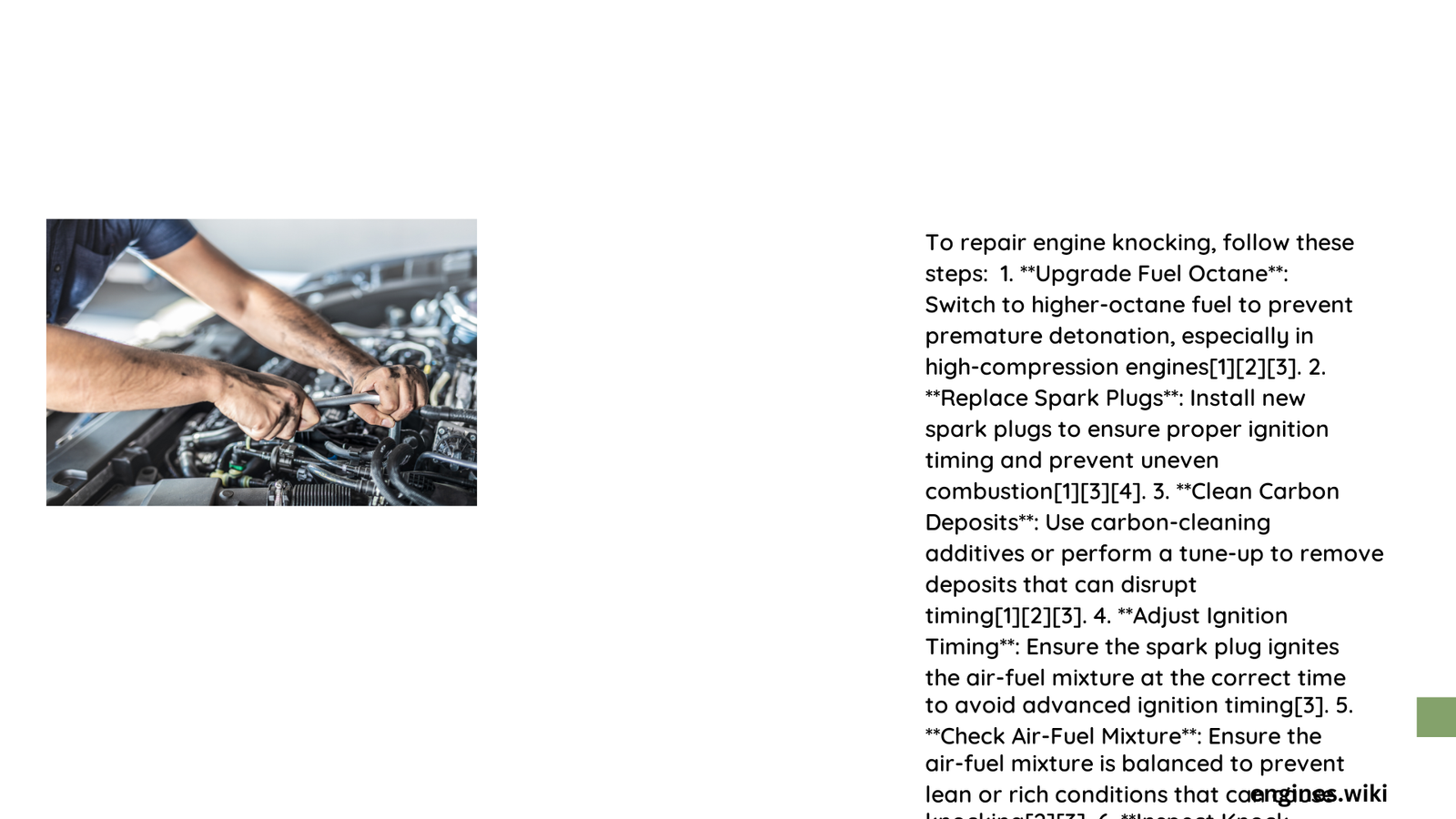Engine knocking is a critical mechanical issue that can signal significant problems within your vehicle’s engine. This destructive phenomenon occurs when fuel combusts incorrectly, creating abnormal pressure waves and potentially causing severe internal damage. Understanding the root causes, diagnostic techniques, and repair strategies is essential for maintaining your vehicle’s longevity and performance.
What Causes Engine Knock?
Why Does Fuel Quality Matter?
Fuel octane rating plays a crucial role in preventing engine knock. Low-quality fuel can cause premature combustion, leading to:
- Uncontrolled fuel ignition
- Increased cylinder pressure
- Potential engine component damage
| Octane Rating | Engine Compatibility | Knock Risk |
|---|---|---|
| 87 (Regular) | Standard engines | Moderate |
| 91 (Premium) | High-performance engines | Low |
| 93 (Super Premium) | Turbocharged/Performance | Minimal |
How to Identify Knocking Sounds?
Diagnostic techniques for identifying engine knock include:
- Chassis Ear Method
- Attach sensors to different engine components
- Listen for distinct metallic sounds
-
Pinpoint exact location of knocking
-
Knock Sensor Technology
- Electronic sensors detect abnormal vibrations
- Provides real-time engine performance data
- Connects with vehicle’s computer system
Effective Repair Strategies

What Are Immediate Repair Steps?
When experiencing engine knock, consider these immediate actions:
- Spark Plug Replacement
- Inspect for wear and damage
- Replace with manufacturer-recommended plugs
-
Cost: $10-$30 per plug
-
Fuel System Cleaning
- Use professional fuel system cleaners
- Remove carbon deposits
- Restore fuel injector performance
Can Timing Adjustments Help?
Ignition timing plays a critical role in preventing knock:
- Retard timing slightly to reduce knock
- Use professional diagnostic equipment
- Consult vehicle-specific timing specifications
Preventative Maintenance Techniques
How to Prevent Future Knocking?
Proactive maintenance can significantly reduce knock risks:
- Regular oil changes
- Use recommended fuel octane
- Perform periodic fuel injector cleaning
- Monitor engine performance consistently
Advanced Diagnostic Tools
What Tools Do Professionals Use?
Specialized equipment for diagnosing engine knock:
- Oscilloscopes
- Advanced vibration analysis tools
- Professional-grade diagnostic scanners
Cost Considerations
What Will Repairs Expense?
Repair costs vary based on underlying issues:
| Repair Type | Estimated Cost Range |
|---|---|
| Spark Plug Replacement | $50 – $250 |
| Fuel System Cleaning | $100 – $300 |
| Major Engine Repair | $1,000 – $4,000 |
Warning Signs to Watch
When Should You Be Concerned?
Critical indicators of potential engine knock:
- Persistent metallic knocking sound
- Reduced engine performance
- Increased fuel consumption
- Check engine light activation
Technical Insights
Engine knocking represents a complex interaction between fuel combustion, mechanical tolerances, and environmental factors. Professional diagnosis requires comprehensive understanding of these intricate relationships.
Final Recommendations
- Address knocking immediately
- Use high-quality fuel
- Maintain regular service intervals
- Consult professional mechanics for complex issues
Reference:
– SAE Technical Paper on Engine Knock
– ASE Automotive Diagnostic Guidelines
– Professional Mechanic’s Diagnostic Manual
